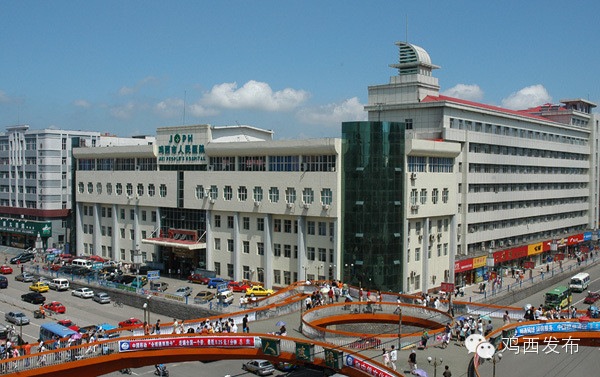JIXI


City Profile
Name: Jixi (China)
Population: 1,500,000
Area: 22,500 km2
Latitude: 44° 57′ 12″ – 45° 28′ 55″ N
Average temperature in 2012: 3.9 °C
Highest temperature in 2012: 34.4 °C
Lowest temperature in 2012: -28.5 °C
Total snowfall between October 2012 and May 2013: 18.14 cm
Flag of Jixi
Sister Cities & Friendship Cities
-
Samchok (Republic of Korea)
City PR
Jixi, located in the southeastern part of the Heilongjiang Province, was established as a city in 1957, with jurisdiction over Mishan City, Hulin City, Jidong County, Jiguan District, Hengshan District, Didao District, Chengzihe District, Lishu District, and Mashan District. With a total area of 22500 square kilometers and a permanent population of 1.5 million, Jixi is a rising comprehensive industrial city, a picturesque border tourism city, and a livable and business friendly waterfront garden city.
Jixi has obvious geographical advantages. Adjacent to Russia, with a total border length of 641 kilometers, Jixi has two national first level land ports, Mishan Dangbi Town and Hulin Jixiang. The ports’ infrastructures are complete and open up passenger and freight transportation routes to Russia, with an annual cargo capacity of 3.6 million tons and a passenger capacity of 1.6 million people, radiating to 17 cities such as the Russian coast and the Khabarovsk border area. Jixi has a unique geographical advantage for conducting economic and trade cooperation with Russia.
Jixi is rich in natural resources. There are 59 types of mineral resources discovered within the territory, with coal reserves of 7.224 billion tons, accounting for about one third of the coal reserves in Heilongjiang province. The annual production capacity is nearly 40 million tons, making Jixi an important coal production base in China. The graphite reserves are 976 million tons, ranking among the top in the world, which is the largest natural flake graphite production area in the world and has been named the “Capital of China’s Graphite” by the China Mining Association. There are over 230 species of wild medicinal herbs, of which more than 100 have been included in the national pharmacopoeia, and have created well known pharmaceutical and health brands such as “Wandashan”, “Wusuli River”, and “Zhenbao Island” that are renowned at home and abroad.
Jixi has great potential in agriculture. Located on northern latitude 45 degrees, it is a globally recognized golden industrial belt for green organic agricultural and sideline products, as well as nutritional and health mountain specialty products. The cultivated land area within the region is over 15 million mu, with an average annual grain output of about 14 billion jin, making it an important production base for commodity grain and green food in the country; With a water area of over 4 million acres, it is rich in aquatic products such as Xingkai Lake big white fish and many other fish, and is known as the “hometown of Xingkai Lake big white fish”; The forest covers an area of over 10 million acres and is rich in mountain products such as fungus, matsutake, honey, as well as wild medicinal herbs such as Acanthopanax senticosus, Platycodon grandiflorus, and ginseng. The planting area of Chinese medicinal herbs in the city has exceeded 350000 acres.
Jixi has a strong industrial foundation. After long-term development, a relatively complete industrial pattern has been formed, mainly consisting of coal, graphite, grain, medicine, coal machinery, electricity and other categories. Jixi relies on its abundant resource advantages and industrial foundation, focusing on building a “one capital, five cities”, accelerating the iterative upgrading of traditional industries such as coal and equipment manufacturing, cultivating and strengthening new industries including graphite new materials, biomedicine, and green food, and future industries such as intelligent computing power and new energy storage.
Jixi, a tourist resort. There are 16 natural reserves and forest parks of various levels and types in the city, as well as 20 scenic spots above Grade A, including 6 Grade 4A and 1 Grade 5A. Xingkai Lake, the boundary lake between China and Russia, is the largest freshwater boundary lake in China with rippling blue waves and vast like the sea; The Wusuli River, the boundary between China and Russia, stretches across the river with clear blue skies and picturesque fields; The colorful wetland is the most well preserved primitive ecosystem in the same latitude region of the world, and it is a paradise for summer vacation, health preservation, and leisure!
Jixi has convenient and smooth transportation. The Hegang -Daqing expressway and Jian Sanjiang-Jixi expressway run through the entire area, and the Mudanjiang-Jiamusi high speed railway has been fully opened. Xingkai Lake airport directly connects to domestic central cities such as Beijing, Tianjin, Shanghai, Guangzhou, Dalian, Qingdao, Shenyang, Hangzhou, Yantai, Shenzhen, Jinan, Chengdu, and Harbin, forming a convenient and smooth railway, highway, and aviation three dimensional transportation network.
Jixi is as beautiful as a painting, welcoming friends all over the world with hospitality. We sincerely invite international friend cities to focus on Jixi, learn about Jixi, and visit Jixi.
More Information
-
Official website: http://www.jixi.gov.cn/
Location






